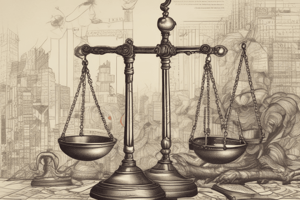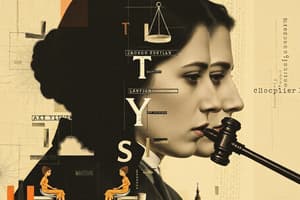Podcast
Questions and Answers
What does the term 'actus reus' refer to in legal terms?
What does the term 'actus reus' refer to in legal terms?
The actual engagement of the offender in a given criminal act.
What is the Classical School in criminology?
What is the Classical School in criminology?
The first rational theory of crime based on expected costs and benefits of criminal behavior.
What characterized pre-classical views on crime?
What characterized pre-classical views on crime?
Focus on supernatural causes of crime.
What was the Age of Enlightenment?
What was the Age of Enlightenment?
What is the brutalization effect?
What is the brutalization effect?
Define 'certainty of punishment' in the context of deterrence.
Define 'certainty of punishment' in the context of deterrence.
What does deterrence theory propose?
What does deterrence theory propose?
What is general deterrence?
What is general deterrence?
What does 'mens rea' mean?
What does 'mens rea' mean?
What is the Neoclassical School?
What is the Neoclassical School?
What is the severity of punishment?
What is the severity of punishment?
Explain the social contract.
Explain the social contract.
What is specific deterrence?
What is specific deterrence?
What is swiftness of punishment?
What is swiftness of punishment?
Define utilitarianism.
Define utilitarianism.
What characterized crime during the Dark Ages?
What characterized crime during the Dark Ages?
Who is Cesare Beccaria?
Who is Cesare Beccaria?
What is Beccaria's stance on the death penalty?
What is Beccaria's stance on the death penalty?
What is spillover theory?
What is spillover theory?
How did Beccaria impact the Western Criminal Justice System?
How did Beccaria impact the Western Criminal Justice System?
Who is Jeremy Bentham?
Who is Jeremy Bentham?
What theory did Thomas Hobbes propose about governance?
What theory did Thomas Hobbes propose about governance?
When did classical and neoclassical theories lose dominance?
When did classical and neoclassical theories lose dominance?
Study Notes
Legal Concepts
- Actus Reus: Refers to the actual act of committing a crime; contrasts with mens rea (intent).
- Mens Rea: Means "guilty mind"; refers to the offender's intent and awareness in committing a crime.
Classical School of Criminology
- Emerged during the Age of Enlightenment in the 17th and 18th centuries.
- Proposed that individuals make rational decisions based on perceived costs and benefits of committing crime.
- Laid the foundation for modern criminal justice systems in Western countries.
Pre-Classical Views
- Relied on supernatural explanations for crime in traditional societies.
- Lack of laws contributed to higher violence; societal structure evolved with settled communities leading to improved education and reduced violence.
Age of Enlightenment
- A philosophical movement emphasizing individual rights and governance.
- Ideas such as the social contract influenced contemporary government and criminal systems.
Crime Dynamics and Theories
- Brutalization Effect: Observation that homicide rates may increase following high-profile executions.
- Certainty of Punishment: Key element of deterrence; implies offenders believe they will be caught and punished.
- Deterrence Theory: Focuses on rationality of individuals and their decision-making regarding behavior based on punishment's certainty, severity, and swiftness.
Types of Deterrence
- General Deterrence: Aims to prevent crime by punishing offenders to dissuade others.
- Specific Deterrence: Targets the individual offender to prevent future crimes.
Punishment Principles
- Severity of Punishment: Must be severe enough to outweigh potential crime benefits without being excessively harsh.
- Swiftness of Punishment: Timely consequences improve deterrent effects.
Philosophical Foundations
- Utilitarianism: Concept of achieving the greatest good for the greatest number, influencing social policies.
Historical Perspectives
- Crime in the Dark Ages: Predominantly governed by mores and folkways, lacking formal laws; associated with spiritual interpretations such as demonology.
- Cesare Beccaria: Father of the classical school; advocated for systematic reforms in justice, emphasizing actus reus over mens rea, and rejected torture and secret accusations.
Beccaria's Contributions
- Strong opponent of capital punishment, viewing it as a violation of the social contract and ineffective as a deterrent.
- Advocated for public justice systems equipped with clear laws, trial by jury, and transparency.
Influence of Beccaria
- Shaped aspects of contemporary criminal justice, emphasizing deterrence, due process, and individual rights.
- Foundations laid in documents like the US Bill of Rights and Canadian Charter.
Key Theorists
- Jeremy Bentham: Introduced hedonistic calculus; designed the panopticon prison, promoting rationality in crime.
- Thomas Hobbes: Proposed that humans enter into social contracts to escape the chaos of a constant state of warfare, advocating for structured governance.
Transition of Theories
- Classical and neoclassical theories declined in dominance by the 19th century due to evolutionary insights from Darwin’s work.
- These frameworks still underpin modern Western criminal justice, despite the recognition of broader behavioral influences beyond mere rational choice.
Studying That Suits You
Use AI to generate personalized quizzes and flashcards to suit your learning preferences.
Description
This quiz focuses on key terms related to Pre-Classical and Classical theories in legal studies. It includes essential concepts such as 'actus reus' and the principles of the Classical School. Understanding these terms is crucial for comprehending legal frameworks.




